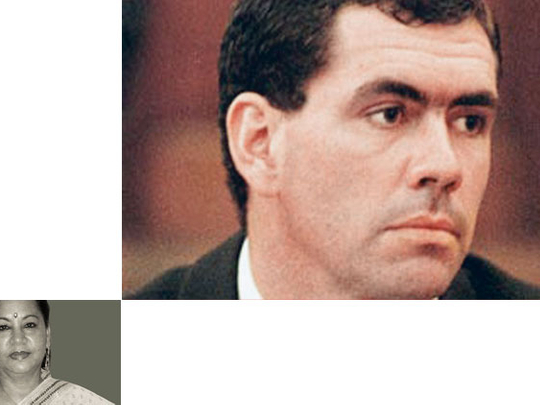
With sports in every school's curriculum, I wonder whether children are still taught the virtues embodied in this often aggressive form of physical activity — mental and physical well-being, spirit of sportsmanship, importance of fair play, generosity in victory and acceptance of loss. These were drilled into us in our day and any show of unfairness or brattishness was severely dealt with. No player could afford to indulge in any form of unsportsmanlike behaviour for fear of incurring the coach's wrath and being responsible for his team losing a game simply because he was not a part of it.
The code of conduct ruling every sport was observed in letter and spirit for the most part, aberrations were infrequent and infractions excited summary punishment and ignominy. The effect on the player, therefore, could be multi-fold with loss of reputation and wealth, scandals and deep depression from which often there was no recovery. Take the instance of Hansie Cronje, the late South African skipper who never got over the shame of the first major match-fixing scandal in cricket.
Limelight
Today, while the scandals continue to hog the limelight for a time, the perpetrators more often than not continue to retain their income and status; it is as if the players and the spectators have all become morally bereft. So where is the lesson to be learnt when a wrongdoer's act is simply a nine days' wonder and he continues to go on as before?
The malfeasances include involvement in betting scandals for which Wayne Rooney's father and uncle were arrested, giving out pitch and weather information to bookies for money resulting in Shane Warne and Mark Waugh being fined, Brazilian referees fixing results of matches on bookies' instructions for which 11 matches were rescheduled besides fines imposed, or losing a basketball final in the US which was exposed as early as 1919. Match fixing in tennis is also not uncommon among lesser known players. Neither is racial and, in India, regional prejudice which rears its ugly head from time to time.
Match fixing
The News of the World tabloid's scoop on match fixing by Pakistan cricketers where bribes were accepted to underperform has recently resulted in life bans and monetary penalties for the guilty. For love of the lucre nothing seems to have been learnt from the infamous Hansie Cronje scandal where guilt and shame eventually cost him his life and Indian skipper Mohammad Azharuddin could never again play for his country.
As far as courtesy and etiquette in sports go, rude behaviour and tantrums appear to be the norm. It is embarrassing for those who have watched greater figures on field and court to watch Indian cricketer S. Sreesanth's juvenile peevishness on the ground; making faces at an international pitch merely evokes contemptuous laughter.
John McEnroe and the Williams sisters are remembered as much for their performances as for the tantrums they have thrown — blasting and screaming at ball girls and umpires and questioning decisions.
Old timers would walk out without waiting for the umpire to declare them out. No wonder Sachin Tendulkar's similar action evoked so many admiring comments.
The behaviour of support staff also bears examination. Their prejudices and sexist biases has done untold harm to the progress of women's sports in India, besides dirty linen washed in public domain being a cause of national embarrassment and outrage.
Where does it end? What action is taken? Nothing, unless the girls involved raise a hue and cry at the cost of invasion of their privacy. Since many of them come from provincial and conservative backgrounds and depend on the sport for their livelihood, bringing these evils into the public domain involves major sacrifices in terms of reputation and income and the chance of continuing to represent their country. Also, who will rebuild the ruined lives of our innocent, illiterate but gifted tribal girls who know nothing about banned drugs and blindly, trustingly swallow the pills given by their mentor and coach?
Finally, there are established ground rules relating to public behaviour and dress code when one represents one's country.
Many like me were mortified to see our Indian cricket team attending an official banquet hosted by the President of Sri Lanka a couple of years ago, wearing T-shirts and similar casual accoutrements, while the smartly turned out host team, appropriately dressed as they were, brought out the stark contrast between the rivals.
Lame excuse
Or take the more recent episode where the Indian team had to apologise for not attending a reception hosted by the Indian envoy in London. The reasons given of prior commitments were lame, vapid, embarrassing, for all that could have been sorted out before the reception was finalised.
Thankfully there are still some greats in all the metiers, from every country, who have no controversies surrounding them, genuine, dedicated, and gentlemen to the core whom the world looks up to with admiration and pride.
Vimala Madon is a freelance journalist based in Secunderabad, India.










